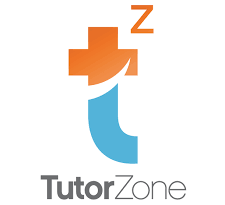Sharing Our Knowledge
Throughout the COVID-19 pandemic, Tutor Zone instructors have made the curriculum engaging, even during online tutoring sessions. We have used resources such as Jeopardy Labs, Nearpod, and Kahoot to increase students’ participation in lessons. Tutor Zone aims to educate parents and students about other online resources.
1. Khan Academy
Khan Academy is a non-profit organization that offers free online lessons in multiple subjects. The website khanacademy.org provides support for English language arts, math, science, history and social studies, test prep, computing, economics, and life skills. This resource includes courses for grades pre-K to college. Students, teachers, school districts, and parents are welcome to use Khan Academy. Students can utilize practice problems to improve their skills and grow advanced in their studies. Teachers can incorporate Khan Academy in the classroom by showing instructional videos on certain concepts to supplement their lessons. Many school districts have partnered with Khan Academy to help students meet Common Core State Standards. Therefore, parents can trust Khan Academy to be a dependable resource.
2. Newsela
On newsela.com, students may focus on developing literacy skills while reading news articles. Important skills in students’ literacy development involve critical thinking and learning to read between the lines. Not only does the Newsela website assist students with reading comprehension, but it also increases their awareness of current events. Newsela also consists of articles in Spanish, which can help Spanish-speaking English language learners. Students and parents may access Newsela articles by using the username and password from Tutor Zone’s lead magnet. Newsela is a valuable tool for enhancing literacy skills because much of its content relates to students.
3. Prodigy
Prodigy is a fun math game with fantasy elements. It is common for teachers to allow students to play on https://www.prodigygame.com/main-en/ during their free time in class. They can solve math problems to complete quests and earn rewards such as gold or new spells. If a school does not provide access to Prodigy accounts, then students may play at home by asking a parent or guardian to create a free parent account. This allows parents to view progress reports to check which math concepts their child needs improvement. Parents may upgrade to a premium membership for $4.99 per month. A premium membership incorporates additional worksheets and video lessons to enhance students’ learning. By playing Prodigy, students might feel more motivated to learn math!
4. PopSci
PopSci, also known as Popular Science, comprises various scientific articles and videos. Students in upper elementary grades and above may read the articles on popsci.com/. PopSci covers topics such as technology, health, animals, space, the environment, gadgets, and goods. Besides reading articles, students can subscribe to the PopSci newsletter, listen to podcasts, and watch videos to learn more information. Additionally, PopSci has social media pages on Facebook, Instagram, YouTube, and other platforms to interact with their audience. Parents may read DIY articles to promote hands-on learning, such as using cardboard boxes to build a rocket ship. Furthermore, students and parents can read product reviews to learn about devices like air conditioners, speakers, and more. After all, Popular Science has been a significant resource for learning about science-related topics since 1872.
5. National Geographic Kids
National Geographic Kids concentrates on content from the National Geographic Society intended for K-12 students. The website kids.nationalgeographic.com/ contains topics such as history, geography, general science, animals, and space. Students can play educational games, watch videos, and read articles about these topics. National Geographic Kids is known for its information on animals including mammals, birds, reptiles, amphibians, invertebrates, fish, and prehistoric creatures. This makes the website ideal for students who are animal lovers! Students may also watch “Weird But True!” clips to learn about odd fun facts. The National Geographic Kids website is free to use. Students can visit the website anytime to grow their interest in science and history.
6. Wrightslaw Special Education
Wrightslaw Special Education, or https://www.wrightslaw.com/, is a website on special education laws. This website is useful for special education teachers and parents of students with disabilities. Parents can advocate for their children with autism, intellectual disabilities, learning disabilities, emotional disturbance, speech impairments, and other disabilities. Many parents may not be familiar with IDEA, or the Individuals with Disabilities Education Act. IDEA enables students with disabilities to have an equal education in the U.S. On the home page of the Wrightslaw Special Education website, parents can watch a video tour to navigate the site. If students with disabilities experience discrimination or legal problems at school, their parents may refer to Wrightslaw Special Education.
7. Federal Student Aid Resources
High school students, college students, and parents may visit studentaid.gov/resources for resources on financial aid for college. Resources include booklets and brochures to prepare for college, videos to explain the financial aid process and types of federal student aid, and more. In fact, several resources are available in English and Spanish. In addition, the information on this website educates students from communities with the most needs such as foster care youth and homeless students. Many parents may not understand how to help their students complete the FAFSA, or Free Application for Federal Student Aid. As a result, this website is a great place to start!
Encouraging Parents and Students to Utilize Resources
Tutor Zone hopes that parents and students will use some, if not all, of the online resources previously mentioned. We understand that it can feel overwhelming sometimes to find quality websites to support students’ education. Click Link for more resources!
by Melissa M.

